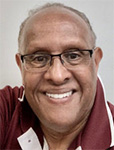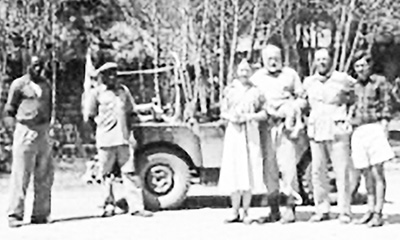Mrs. Hemingway and Peace Corps Volunteers in Tanzania
by Geri Critchley Senegal 1971-72

Geri Critchley
A year after I wrote an article in “Peace Corps Worldwide” about finding Hemingway in Tanzania, E Africa, I received an email: “Finding Mrs. Hemingway — a 60-year mystery” from Hussein Issa.
Hussein wrote, “Your article, “A Writer Writes: Hemingway in Africa” helped me narrow my search and finally solve a 60-year old mystery. Who was Mrs. Hemingway? — my first-grade teacher in Arusha, Tanzania. My previous searches were centered on Ernest Hemingway’s wives, but their timelines didn’t seem to fit the period I met her. As soon as I finished reading your article, I started to focus on Patrick Hemingway’s wives.”
Hussein went on to say that at the age of 7, he was brought from Kenya to Tanzania to live with his stepmother to attend the Aga Khan Elementary School in Arusha. He was angry that he was taken from his mother, homesick and scared. During this time, schools were legally and racially segregated under British colonial rule. Hussein was confused why he could not attend an “African” school that was right across the street from his house. Most of the students in his new school were of Indian descent, and he did not know the language. Hussein continues, “I was the only kid in class who couldn’t speak English. The Indian kids had a head start in kindergarten. According to British rule, African schools were not allowed to teach English before the 4th grade so I couldn’t speak a word of English.”
He felt suspended in a foreign world – vulnerable and alone and angry. He could not defend himself from the bullies. It was his teacher Mrs. Hemingway who took him under her wing and sat him in the front of the class with the girls who helped him learn the language and befriended him (and he protected them from the bullies.) Hussein has always wanted to tell Mrs. Hemingway how much she changed his life and thank her, but he couldn’t find her. He said she was his “guardian angel”.
Mrs. Hemingway encouraged and complimented him, told him he was smart and had the best penmanship in the class – and also gave him chocolates. He couldn’t wait to go to school each morning to see Mrs. Hemingway. He always thought “Mrs” was her first name and couldn’t understand why was she so nice and also white?
When he was in second grade and returned late from vacation from visiting his mother in Kenya, he was kicked out by his British teacher. He never saw Mrs. Hemingway again. He then was happy to attend the African public school across from his house.

Arusha Secondary School
Hussein went on to Arusha (Tanzania) Secondary School and graduated in 1968. It was one of the first schools in Africa to accept Peace Corps teachers in the mid-60s.
Hussein continued, “Peace Corps volunteers flipped the switch to liberation for me — not into rules for their own sake. They wanted us to enjoy learning and to express our opinions freely and even eat in class — all revolutionary.” — refreshing after the pervasive colonial attitude he had lived with. President Nyerere was the first African leader to accept aid from the Kennedy administration, and Sargent Shriver was an admired friend. Hussein writes, “Peace Corps teachers were like a breath of fresh air. That’s why I chose to come to America instead of accepting a scholarship to England.” He also wanted to join his brother who was in the USA on a scholarship at Harvard in the same program as President Obama’s father.
Post high school, Hussein was one of two students selected to attend the prestigious Mkwawa A level Prep School that, before independence, was the feeder school for whites to attend Oxford. He was taught there by PCVs from 1969-1971
Hussein eventually received a scholarship and graduated from Brandeis University in Boston.
After our phone call, Hussein called Patrick Hemingway in Montana. When a woman answered the phone, he slowly and carefully explained why he was calling to see if this was his former teacher. He quickly realized this was not Mrs. Hemingway he was looking for, and she passed the phone to Patrick. Patrick was shocked and elated to hear from one of his late wife Henrietta (Hennie) Broyles Hemingway’s former students from 60 years ago. He then told Hussein that Hennie had died young, and he had remarried. In the early ’60s, Patrick came back to the USA to do a post-graduate degree at Berkeley, and his wife Hennie died a year later at the age of 34.
Eventually, Patrick returned to Tanzania where he lived and worked for the next 25+ years as a big game hunter and safari guide (like this father Ernest) and in wildlife management for the United Nations. It was in E Africa, after Ernest Hemingway’s almost fatal double private plane crashes, that Patrick last saw his father.
Hussein has told this story throughout his life to anyone who would listen. He thinks he might have ended up in jail if it weren’t for Mrs. Hemingway’s kindness and encouragement. He had been a rambunctious troublesome child not interested in school. However, after meeting Mrs. Hemingway, it all changed for him — as it changed later in high school and post-high school with Peace Corps teachers. Their acts of kindness and caring gave him the acceptance and encouragement he needed to set him on the right track.

Hussein Issa
For 20+ years, Hussein has been teaching at an alternative school for at-risk children and also ESL to those who, like himself in 1st grade in Tanzania, can not speak the language of the country where they’re living and have a difficult time adjusting to their circumstances. His passion is to assist his students’ adaptation to their new country and difficult circumstances to make sure they feel welcome. His joy comes from the outflow of appreciation they express to him and the realization he has changed many lives and put them on the right track the way Mrs. Hemingway and PCVs did for him in Tanzania. Mrs. Hemingway and Peace Corps volunteers and their acts of kindness – continue to live on with gratitude in his life every day – for 60+ years – overflowing to all those he meets. That’s a real legacy.

Henrietta “Hennie” Broyles Hemingway, Ernest Hemingway, Percival/safari guide, Patrick “Mouse” 2 safari African assistants Credit: John F. Kennedy Presidential Library and Museum
Read: Geri Critchley’s “Hemingway in Africa”, Peace Corps World Wide, April 2005

1963
The inclusion of the information concerning Mrs. Hemingway and the follow-up with her student really made the story for me. I am so glad I am still able to start most days with these posts.
Kudos for American classroom culture, where students are people, and for the PCVs, who carried it around the world.